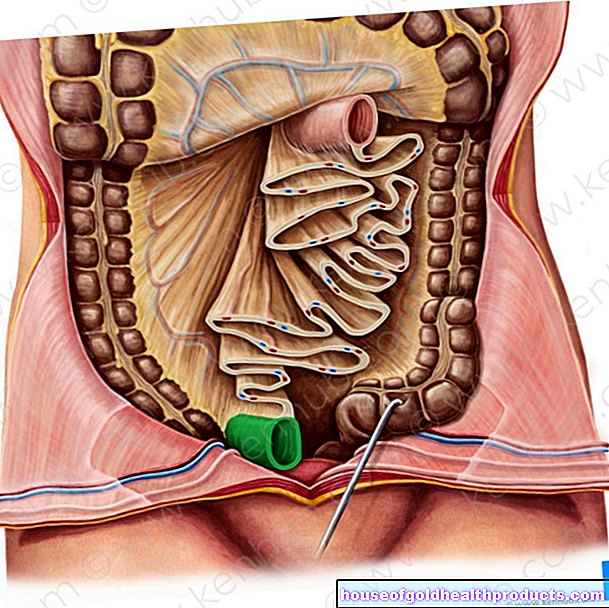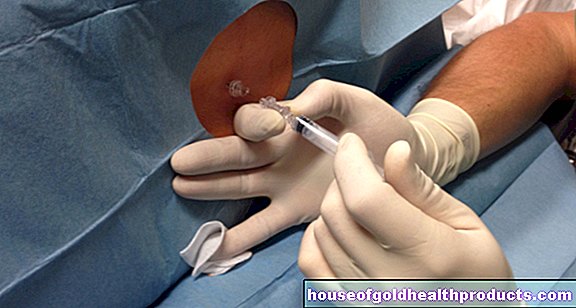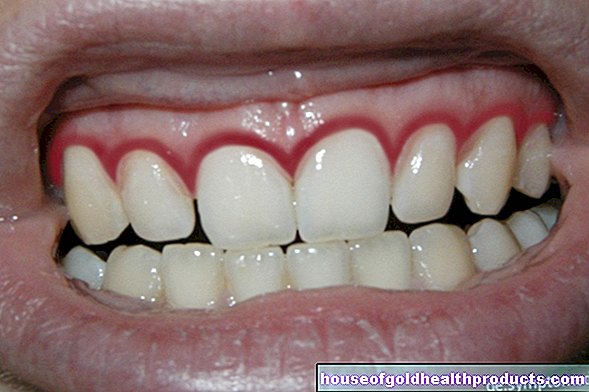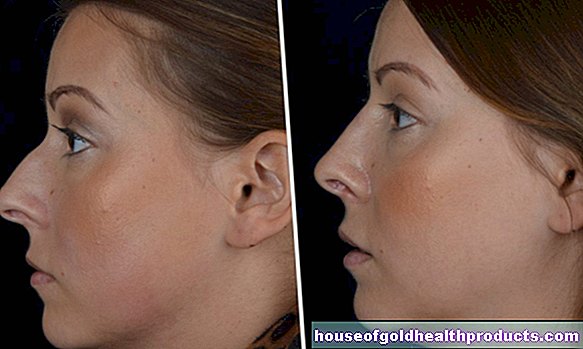Foreign body in the ear
Carola Felchner is a freelance writer in the medical department and a certified training and nutrition advisor. She worked for various specialist magazines and online portals before becoming a freelance journalist in 2015. Before starting her internship, she studied translation and interpreting in Kempten and Munich.
More about the experts All content is checked by medical journalists.A foreign body in the ear is usually noticeable in that you can only hear muffled on the affected side or - if there is water in the ear - a hissing noise. While small children often stick something in their own ears out of curiosity (e.g. pebbles, peas, pearls), in adults the foreign body in the ear is usually water or a plug of ear wax. Insects like a fly or spider in the ear are also possible. Read here how to provide first aid in the event of a foreign body in the ear and when it is advisable to see a doctor.

Brief overview
- What to do if there is a foreign body in the ear If you have a lard plug, rinse your ear with lukewarm water. Eliminate water in the ear by hopping or blow drying. See a doctor for all other foreign bodies.
- Foreign bodies in the ear - Risks: i.a. Itching, coughing, pain, discharge, possibly bleeding, dizziness, temporarily impaired hearing or hearing loss
- When to the doctor Whenever the foreign body in the ear is neither a wax plug nor water. If a wax plug or water in the ear cannot be removed with first aid. If there are signs of infection or injury to the ear.
Caution!
- Never try to pull the foreign body in the ear out of the ear canal with the help of ear swabs, tweezers or the like. You could push it further into your ear and injure your ear canal and / or eardrum.
- If you have an insect or leftover food (like breadcrumbs) in your ear, don't wait to see if it comes off on its own. This increases the risk of infection, which can have serious consequences (including meningitis)!
Foreign body in the ear: what to do?
Only in certain cases should you try to remove a foreign body in your ear on your own - namely if you have a wax plug or water in your ear:
- Ear wax plug: it can sometimes be rinsed out with lukewarm water. There are also drops in the pharmacy that soften the ear wax.
- Water in your ear: If you have water in your ear after swimming, for example, you can try shaking it out. To do this, tilt your head to the side of the affected ear and start hopping. Alternatively, you can blow dry the ear canal (hold the hair dryer approx. 30 cm from the ear!). Sometimes you can suck out the fluid in your ear with the tip of a tissue.
Foreign bodies in the ear: risks
If someone has something in their ear, it can have various consequences or manifest itself in different symptoms:
- itching
- possible urge to cough (because the body tries to "explosively" free itself from the foreign body in the ear)
- pains
- Blood leaking from the ear (if the foreign body has injured the ear canal or eardrum)
- Hearing loss or hearing impairment (usually only temporarily until the foreign body is removed)
- possibly foul-smelling discharge
- Infection of the ear canal (ear canal inflammation) if the foreign body has introduced germs or remains in the ear for a long time. As the inflammation progresses, pus can become encapsulated (abscess). In addition, the inflammation can spread to the middle ear (otitis media).
- severe dizziness or otitis media if the eardrum has been injured from improper removal of the foreign body
- rare: inflammation of the brain or meninges (encephalitis or meningitis) as a serious complication of an infection in the ear area
Foreign bodies in the ear: when to see a doctor?
If a small wax plug or water in your ear cannot be removed with the first aid measures described above, you should see an ear, nose and throat specialist.
If there is another foreign body in the ear, you should always leave it to the doctor to remove it. Attempts to remove such foreign bodies in the ear easily end up with injuries to the ear canal or eardrum. Or the foreign body is accidentally pushed deeper into the ear (e.g. a marble or an insect in the ear).
You should also always see an ENT doctor if you have pain in the ear canal - even if this occurs after the foreign body has been removed. For example, if you get an earache soon after getting water in your ear, it could be caused by germs in the water.
You should also contact a doctor immediately if you have symptoms such as blood or foul-smelling secretions from the ear, severe dizziness or hearing problems.
Foreign bodies in the ear: check with a doctor
First, the doctor asks the patient or accompanying person (e.g. parents) what could be in the ear canal, how it probably got there and what symptoms are occurring.
After this conversation (anamnesis), the doctor takes a closer look at the inside of the affected ear. To do this, he usually uses an ear microscope and / or an ear speculum with a light source (otoscope). For a better look, he may pull the auricle back a little. The examination shows, for example, where exactly the foreign body is located. Injuries and an infection as a result of the foreign body that has penetrated can also be detected with ear microscopy and otoscopy.
Foreign body in the ear: treatment by the doctor
Depending on what is blocking the ear, the ENT doctor has different options for treatment.
Removal of ear wax
Doctors can sometimes pull out a wad of ear wax with a metal spoon (curette) or a hook. In other cases, he rinses it out of the ear canal using a small water nozzle. Another method works faster and more pleasantly - suctioning off the lard with a special device.
Removing water in the ear
The doctor can also aspirate residual water from the ear canal.
Removing other foreign objects
Many other foreign bodies in the ear can also be removed with the suction device or a small, blunt hook. The doctor often pulls out objects with edges (e.g. paper) with small special pliers, the so-called alligator pliers.
If the foreign body is deep in the ear (near the eardrum), surgical removal under light anesthesia can be useful. This is especially true for children: Without anesthesia, they could fidget when removing it, which the doctor could accidentally injure the eardrum.
In the case of insects (e.g. cockroach, spider or fly) in the ear, the doctor often puts a substance in the ear that kills the animal. That way he can get it out more easily.
If there is pain in the ear, the doctor may fill the ear canal with an anesthetic (e.g. lidocaine) before removing the foreign body.
After removing the foreign body
After removing the foreign body, the doctor examines the inside of the ear for any injuries. These can be treated with an antibiotic ointment, for example. If the foreign body in the ear triggered an infection (e.g. otitis media), the doctor can also prescribe antibiotics to be taken (e.g. in tablet form).
If the patient has reported hearing problems before removing the foreign object in the ear, the doctor will usually perform a hearing test afterwards. If hearing is still impaired, the middle or inner ear may have been damaged. More detailed investigations will follow for clarification.
Prevent foreign bodies in the ear
- Do not let small children play with small objects such as paper balls, toy parts, peas, stones, etc. unsupervised.
- Always be there when older children handle pointed or sharp objects (e.g. knitting needles, scissors). Explain to them the possible dangers of careless handling of such objects.
- When swimming, special earplugs can prevent water from entering the ear canal.
- Do not clean your own ears or those of your children with cotton swabs. This usually only pushes the wax back to the eardrum, where it can get stuck. In addition, remnants of the cotton wool can remain in the ear.
- A wax plug can repeatedly form in the ear, especially if the ear canals are narrow. Those affected should have their ears cleaned regularly by a doctor.
If you take these tips to heart, you can significantly reduce the risk of a foreign object in your ear.
Tags: interview hair alternative medicine



















.jpg)


.jpg)






